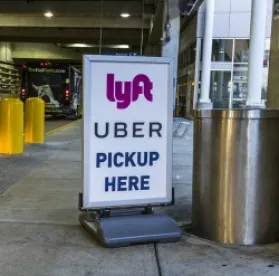On Thursday, October 22, 2020, the California Court of Appeal denied Uber and Lyft’s request to overturn a recent California Superior Court’s preliminary injunction ordering the companies to reclassify their drivers as employees, rather than independent contractors. With the appeal garnering Amicus Curiae briefs from more than 50 different organizations—ranging from the U.S. Chamber of Commerce to Mothers Against Drunk Driving—the decision marks the most recent entry in the highly watched ongoing litigation against the companies over their compliance with A.B. 5. With California’s upcoming vote on Proposition 22, however, many are left wondering what, if any, impact the denial might have on Uber, Lyft, or the gig economy as a whole.
The litigation involves a recent complaint filed by the California Labor Commissioner alleging, in relevant part, that Uber and Lyft violated California’s recently enacted legislation, A.B. 5, by classifying their app-based drivers as independent contractors, rather than employees. Under A.B. 5, companies are required to classify their workers as employees unless the companies can show:
-
The workers are generally free from the company’s direction and control over how they perform their work;
-
The workers are not engaged in the type of work the company usually engages in in its regular course of business; and
-
The workers are engaged in an established trade or professions separate and apart from the company itself.
Whether or not Uber and Lyft’s app-based drivers satisfy this test has been a hotly debated point of dispute. For Uber and Lyft, however, the consequences of being found to not pass this test are potentially dire, as an adverse decision on this point would force the companies to restructure their entire business model by changing the classification of their app-based drivers from independent contractors to employees.
The appeal was motivated by a California Superior Court’s recent decision to issue a preliminary injunction that ordered Uber and Lyft to begin this reclassification process, even prior to the suit’s resolution—a decision signaling that the Superior Court believed the companies to be fighting an uphill battle they would ultimately loose. In light of the order, Uber and Lyft promptly appealed the decision, citing in relevant part, the grave harm that the order would cause by necessitating “substantial changes to…organizational structure, hiring processes, software tools and management systems, and company culture.” To adapt to these forced changes, the companies explained that they would likely need to “reduce the number of drivers” allowed to use the platform, “control the drivers’ time…by having them work scheduled shifts,” and “prohibit drivers…from unilaterally rejecting or cancelling rides.” Unfortunately, Uber and Lyft’s arguments ultimately fell on deaf ears, as the Court of Appeal affirmed the lower court’s ruling forcing the companies to reclassify their app-based drivers—although the order isn’t set to take effect for at least 30 days.
Proposition 22 could save Uber and Lyft from this fate long before those 30 or so days are up. Currently set for the November 3rd ballot, Proposition 22, would exempt certain gig-economy companies, like Uber and Lyft, from the strictures of A.B. 5 while simultaneously allowing for a new middle ground between independent contractor and employee classification. The ballot initiative would do this: (a) allowing app-based drivers to maintain their traditional independent contractor status; while also (b) providing them with new and added benefits not previously available to independent contractors—a compromise that could inhere to the benefit of both parties.
If successful, Proposition 22 could stop the California Labor Commissioner’s suit in its tracks. As a result, only time will tell if the recent Court of Appeal ruling will ultimately have any impact on Lyft, Uber, or the gig economy generally.



 />i
/>i

